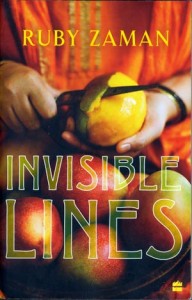 The setting is revolutionary-era Bangladesh, and political players include Pakistan, India, Bengali revolutionaries, and perhaps the central focus of the book, the Biharis. Bangladeshi author Ruby Zaman’s Invisible Lines (2011, ISBN 978-93-5029-071-2) weaves a thrilling tapestry of intrigue, war, and romance in this thriller, but Western audiences are advised to consult an encyclopaedia to understand these players as they sit down to read.
The setting is revolutionary-era Bangladesh, and political players include Pakistan, India, Bengali revolutionaries, and perhaps the central focus of the book, the Biharis. Bangladeshi author Ruby Zaman’s Invisible Lines (2011, ISBN 978-93-5029-071-2) weaves a thrilling tapestry of intrigue, war, and romance in this thriller, but Western audiences are advised to consult an encyclopaedia to understand these players as they sit down to read.
And who are the Biharis? Here’s what Wikipedia says: “Stranded Pakistanis, also known as Biharis, mainly describes the Muslim Bihari ethnic group from the Indian State of Bihar, currently residing in Bangladesh, descendants of migrants from Bihar to East Pakistan at the time of the Partition of India to join the Muslim state of Pakistan. They spoke Urdu, which became the official language of Pakistan, but put them at odds with the Bengali-majority in the region.”
The book does have a protagonist of sorts, Zebunnessa Rahim, the daughter of a Bihari businessman. The book however, chronicles the fates of a number of individuals over two extended familes, Bihari and Bengali, who continue crossing over each other over two continents. We here at WoWasis found the story to be intriguing enough to keep us enraptured throughout the entire book. The war which eventually created the nation of Bangladesh created enemies from friends and turned erstwhile revolutionaries into perceived reactionaries, a situation created when Muslims who fought for Pakistani independence were deemed traitors by Bengalis trying to win independence from Pakistan.
The story is woven intricately by Zaman, and her forays into culture, from weddings to parties, borders on the anthropological. We frankly wished that the author had differentiated the names a bit more. This is a book that trandscends time periods, and her women have names that are similar enough for Westerners that we found ourselves having to retreat through the book to get everyone straight. Shilu, Seema, Sakima, and Sabiha are women who appear in the book, long with the men Shafiq and Samir. That’s a lot of esses. What would have helped tremendously would be a family tree or two, a great place to return to for the temporarily dislodged reader.
But all that aside, this is a very good book. It’s a very good introduction to the forces that created both Pakistan and Bangladesh, and we loved the story and its cultural elements. Ruby Zaman is a lawyer by training, and this is her first book. It’s a good one, and we look forward to her next. Buy it here at the WoWasis eStore.
Leave a Reply